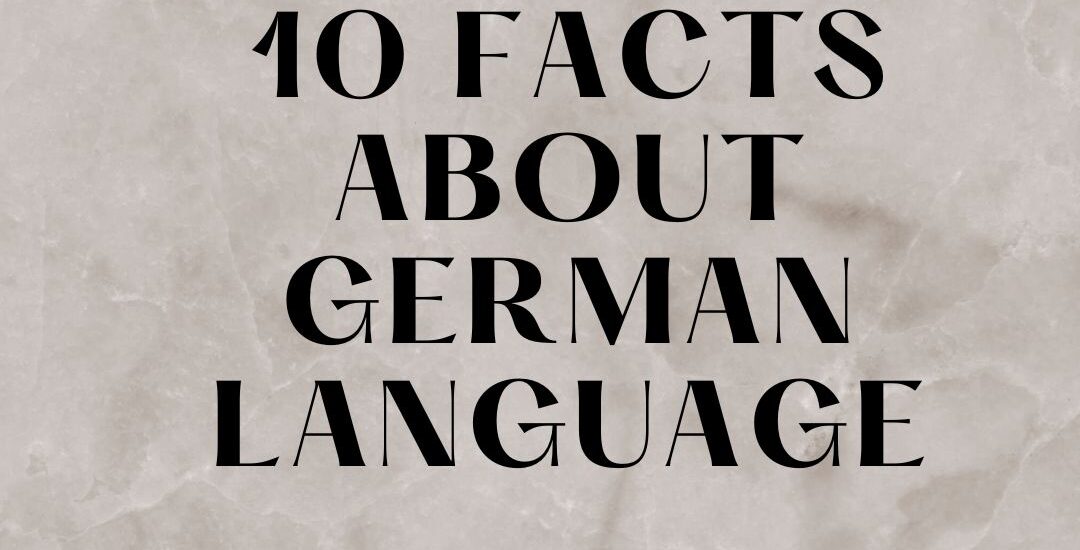If you have ever tried to learn how to speak German, you’d know how difficult it is to master this spectacular language. Just when you think you have the hang of it, you are blindsided by the grammar, traits and descriptions that are more or less pretty poetic. For any language enthusiast, learning German is a challenge that is fascinating and, well, fun. Well, be that as it may, for now, let’s take a look at some interesting facts about the German language in this article. Also note there are different types of translation for different countries such as NAATI translation and USCIS translation .
10 Amazing Facts About German Language
Whether you’re fascinated by the capitalization quirk, eager to unravel the mysteries of compound words, or up for the challenge of German pronunciation, the German language is a vibrant and captivating linguistic adventure waiting to be explored. Here are some interesting facts about German language:
The German Language Is Worldwide:
German may not be as widely spoken as languages like Spanish or English, but it still boasts an impressive 200 million speakers around the globe. It’s like a secret language club that spans across different countries, making German a valuable resource for exploring Europe.
A Linguistic Journey:
German is a West Germanic language that has evolved over centuries. From its origins in the Scandinavian region, it travelled to what we now know as Germany, splitting into Low German and High German along the way. While High German became the dominant form, Germany’s regional diversity still shines through in various dialects, like a symphony of linguistic flavours.
The Capitalization Quirk:
German has a unique typographical feature that sets it apart—every noun is capitalized! Unlike English, where only proper nouns receive capitalization, German gives all its nouns the royal treatment. It’s like a visual clue that helps new language learners identify the nouns in a sentence.
The Gender Bender:
German nouns don’t play by the rules of neutrality. Instead, they come in three genders: masculine, feminine, and neuter. While English has bid farewell to gendered nouns, German embraces them. Navigating the gender of nouns can be a challenge, but with practice and exposure, it becomes easier to remember.
False Friends Alert:
German and English may share some similarities, but they also have their fair share of “false friends.” These are words that look the same but have completely different meanings in each language. For example, “Gift” doesn’t mean a present, but poison in German. These linguistic surprises keep language learners on their toes and provide amusing anecdotes along the way.
Untranslatable Gems:
Some German words defy translation, capturing unique human experiences. Words like “Schadenfreude” (joy in others’ misfortune) or “Kummerspeck” (indulging in food due to grief) highlight the complexity of the German language. It’s like uncovering a treasure trove of emotions and perspectives that transcend language barriers.
The Rise of Denglish:
The interaction between English-speaking and German-speaking cultures has given birth to a hybrid language called “Denglish.” It’s a playful mix of German and English words that is especially prevalent among younger generations. From “die Aircondition” to “der McJob,” these linguistic mashups add a touch of uniqueness to the German language.
The Compound Word Extravaganza:
German loves its compound words, creating monsters of vocabulary that can be intimidating at first glance. While words like “rindfleischetikettierungsüberwachungsaufgabenübertragungsgesetz” (law for the delegation of monitoring beef labelling) may seem overwhelming, breaking them down reveals their meaning. It’s like solving a linguistic puzzle and appreciating the logic behind these word creations.
Pronunciation Puzzles:
German pronunciation can be a challenge for non-native speakers, leading to some entertaining moments. Tongue twisters like “Eichhörnchen” (squirrel) or “Streichholzschächtelchen” (a little matchbox) test the limits of pronunciation skills. It’s like a verbal rollercoaster that adds an extra layer of excitement to learning German.
Myth Busted:
Contrary to popular belief, German was never on the verge of becoming the official language of the United States. While there was a vote in 1975 regarding laws submitted in German, it wasn’t about making German the official language. The legend surrounding this vote is just that—a myth. It’s like a linguistic urban legend that adds a touch of whimsy to the history of the German language.
Wrapping Up!
The German language is a fascinating and unique linguistic journey filled with quirks, challenges, and surprises. With its worldwide presence and diverse range of dialects, German connects millions of speakers across the globe, offering a gateway to exploring Europe and its rich cultural heritage. The capitalization of nouns and the presence of three genders add an interesting dimension to German grammar, making it both intriguing and challenging for language learners. False friends and untranslatable words provide delightful linguistic twists, highlighting the complexity and depth of the German language. The rise of Denglish, the fusion of German and English, showcases the evolving nature of language in a globalized world. German’s love for compound words creates linguistic puzzles that require careful deconstruction, rewarding learners with a deeper understanding of the language’s logic. Pronunciation challenges and the debunking of language myths add an element of fun and surprise to the journey of mastering German.
All in all, exploring the German language is a captivating adventure that invites learners to embrace its unique features and discover the beauty of its rich linguistic tapestry.





